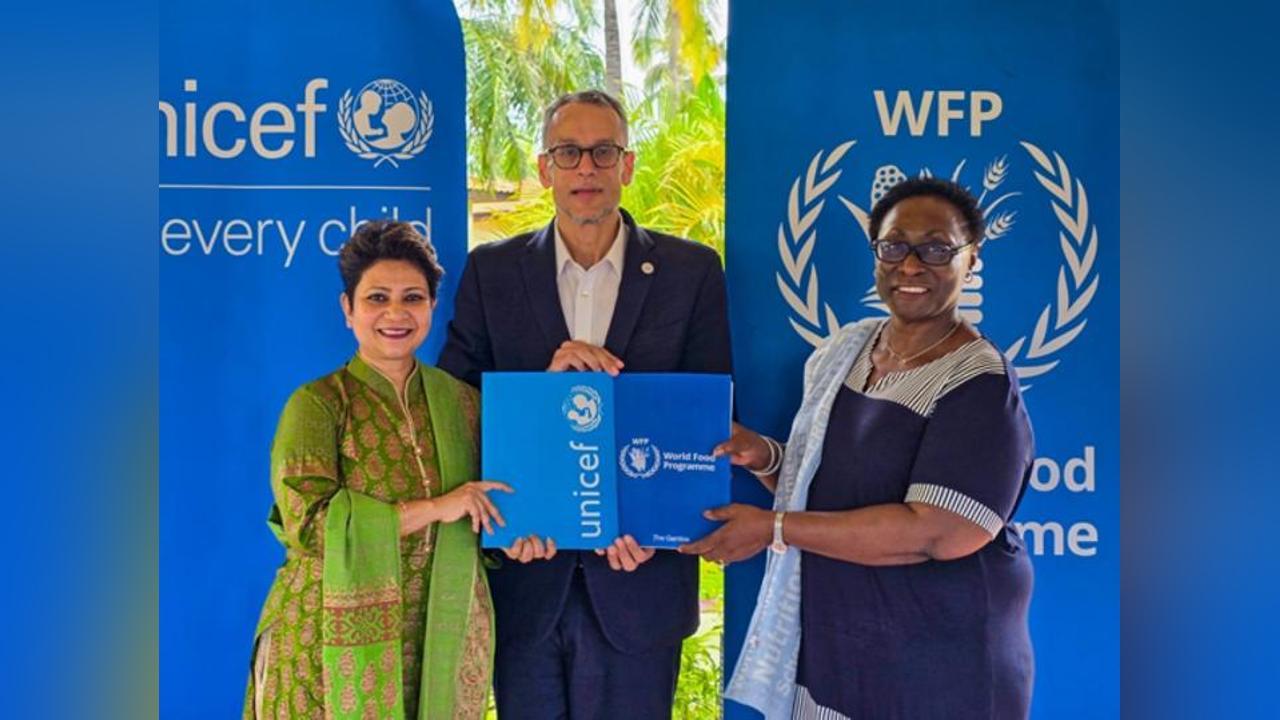Africa-Press – Gambia. The United Nations Children’s Fund (UNICEF) and the World Food Programme (WFP), on Wednesday signed a new Memorandum of Understanding (MoU) to jointly-deliver services to vulnerable groups and communities in The Gambia.
Held at Ocean Bay Hotel in Bakau Cape Point, the MoU marks a historic partnership between the two UN agencies.
It also signals a powerful united front in the fight against all forms of malnutrition, particularly those affecting children under five, pregnant and breastfeeding women and girls. The partnership reaffirms the agencies joint efforts in supporting the country’s emergency preparedness and response, ensuring national and sub – national systems strengthening timely and effective response to the urgent needs of the most vulnerable groups affected by emergencies.
The partnership is also expected to synergise systems strengthening and service delivery to the most vulnerable.
It is designed to focus on improving WASH facilities in schools, raising awareness on climate change and promoting climate actions, social protection and social and behavioural change while promoting gender equality.
The collaboration also aims to reinforce coordinated efforts for joint advocacy and programming where possible as well as to support the development of joint proposals and systems strengthening and service delivery to improve the wellbeing and resilience of the most vulnerable children and communities.
Ms Nasifa Binte Shafique, the Unicef Country Representative in The Gambia, said the MoU is a bold step forward that demonstrates their shared determination to support government leadership in humanitarian action, emergency preparedness and response.
“Our mission is to end all forms of malnutrition, confront food insecurity, and build resilience so shocks do not become crises. No child under five, no pregnant or breastfeeding woman and girl or vulnerable community should be left behind. That is the standard we want to set today’s MoU.”
Ms Shafique said the MoU aligns with The Gambia’s path to the SDGs-especially SDG 2 and SDG 3.
“It is grounded in the Convention on the Rights of the Child, the International Conference on Nutrition Declaration and Plan of Action, and the Government’s Recovery-focused National Development Plan 2023-2027.”
Miranda Sende, the WFP Representative, said the UN agencies are at the forefront of the global fight against malnutrition in children, women and other vulnerable segments of the population.
“This memorandum reinforces our commitment to strengthening national capacities, advancing data-driven nutrition responses, and ensuring that the most vulnerable people, especially children, receive the care and protection they deserve,” she said.
She expressed optimism that with a strong WFP-Unicef partnership, cooperation with the government, and coordination between all relevant partners, a lasting impact on the reduction of malnutrition in The Gambia would be achieved.
Karl Frederick Paul, the UN Resident Coordinator in The Gambia, said the MoU marks a crucial partnership and reaffirms the two agencies commitment to combine their strengths and expertise to fight all forms of malnutrition, particularly those affecting children under five, pregnant and breastfeeding women and girls.
“It also lays the foundation for cooperation in various other areas, including education, climate change, and social protection. I strongly believe that inter-agency collaboration is indispensable to improve our effectiveness and efficiency.”
Through the MoU, he added, “The two agencies also lay the groundwork for stronger cooperation and better alignment in their work.”
He added that the MoU comes at a critical time when current global financial crisis and the ongoing UN80 reform call for achieving more and better with less, demonstrating the power of strategic partnerships, joint programming and resource mobilisation.
“Many Gambian households continue to suffer from food and nutrition insecurity. As long as this situation persists, the fight against hunger continues.”
He said as the country continues its journey towards achieving the Sustainable Development Goals (SDGs), there is still a lot of work ahead of it.
“However, I firmly believe that by enhancing collaboration, uniting our efforts, and cultivating meaningful synergies, we can achieve a future free from child hunger and malnutrition,” he stated.
For More News And Analysis About Gambia Follow Africa-Press






